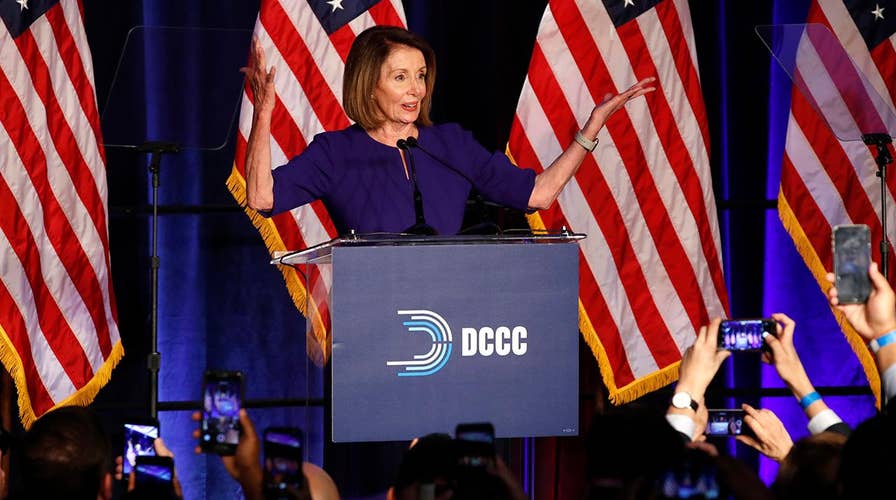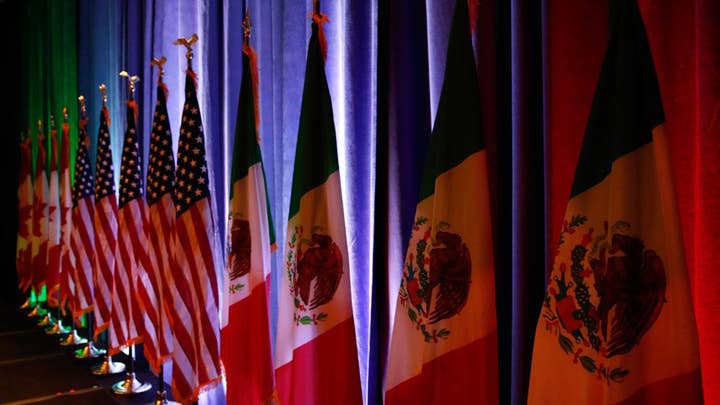Democrats bottle up, defeat USMCA at their own peril: Curtis Ellis
Former Trump campaign trade and jobs adviser Curtis Ellis on the future of USMCA.
In the spirit of opposing everything Trump – House Speaker Nancy Pelosi has announced the House will not take up legislative approval of the recently revised NAFTA – the U.S.-Mexico-Canada Agreement (USMCA) – until Mexico first changes its trade laws to comply with the deal. This flies in the face of Mexican pride – an issue not to be trifled – and jeopardizes many gains organized labor and critics of free trade on the left have long sought.
The original agreement was implemented in 1994 – long before the digital revolution, the mapping of DNA and biologicals and Chinese mercantilism so fundamentally threatened North American jobs.
NAFTA has integrated supply chains across all three countries, permitted the auto and other industries to keep activities on this continent that might have gone to Asia and enabled Mexico to avoid much of the instability that has plagued nations further south.
INTERNATIONAL TRADE IS INCREDIBLY IMPORTANT TO SMALL BUSINESSES – HERE'S WHY
Detractors point to the $78 billion bilateral trade deficit with Mexico. President Trump likes to cite a deficit with Canada that does not exist – we have a deficit on goods but once services are added, we have a modest surplus with our northern neighbor.
The facts are that Mexico City used NAFTA to become a springboard for global free trade. It has negotiated deals with the EU, Japan and more countries than any government on the planet. U.S. automakers and other manufacturers – as well as many service providers – can set up shop in Mexico and take advantage of duty-free or preferred access to those markets – that’s something they can’t do from the United States.
That giant sucking sound that Ross Perot talked about was not cheap labor – though that surely helped – but simply a smarter trade policy than the Americans who have become decidedly adept at blaming others, whether justified or otherwise, for job losses and mounting foreign debt to finance trade deficits.
Whatever your thinking or visceral instincts about President Trump and Peter Navarro’s ruminations on trade, America’s chief negotiator, Robert Lighthizer should get his head chiseled on the Mount Rushmore of American trade officials and policy wonks for his accomplishments in the negotiating the USMCA.
Some are unalloyed benefits for those who like open markets and free competition. For example, Lighthizer won better access in Canada for U.S. dairy, poultry and eggs – make or break goals for U.S. farmers. The agreement contains stronger protections for intellectual property and much freer access for U.S.-based technology services, and safeguards against the protectionist impulses of legislators and bureaucrats to undercut those, for example, by prohibiting government regulations that cloud and data services must be domiciled in any one of three countries.
Recognizing the threat that China poses with its subsidized steel and aluminum and rising and state-promoted car industry, it raises from 62.5 to 75 percent the North American content required in autos to qualify for duty-free treatment and that the metals in cars be largely of North American origin. And it includes some tougher content requirements – what we call in the trade wonk world “rules of origin” – in textiles, chemicals, glass and optical fiber.
It also requires that 40 to 45 percent of the labor in motor vehicles be paid at least $16 an hour. This mostly applies to Mexico as the United Autoworker, as their Canadian brethren get a lot more than that in wages and benefits.
Free trade purists see such provisions as protectionist but trade agreements are not negotiated on college classroom blackboards, where workers magically move from production jobs in auto parts plants in Michigan to coding jobs in Seattle when Chinese or Korean imports, benefiting from a state subsidy or cheap currency, knock off their jobs.
It’s hardly free trade for a Taiwanese bicycle manufacturer to source parts in China and set up screwdriver operation in Mexico to attach a few wheels and then send the product north to evade U.S. tariffs.
Without handicapping the deal with complexity only benefiting trade lawyers and bureaucrats and to combat China playing one USMCA partner against another, the agreement imposes on Mexico and Canada a tough choice – free trade with China or America.
CLICK HERE TO GET THE FOX NEWS APP
If they enter into a deal with the Middle Kingdom, they are out of the agreement and the USMCA becomes a bilateral deal between the remaining two partners.
Like sausages and laws – free trade deals are made in the real world with folks for an appetite for progress. The possible is never perfect, and House Democrats should put aside their partisan instincts to help pass it.


